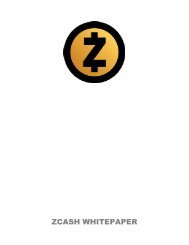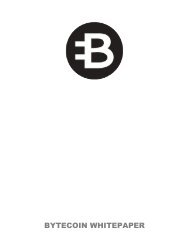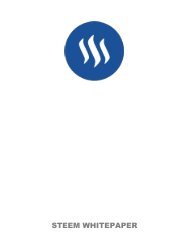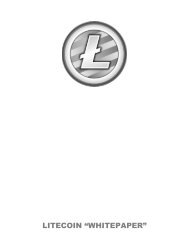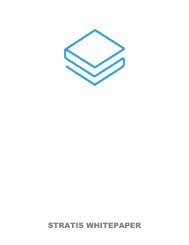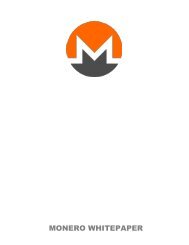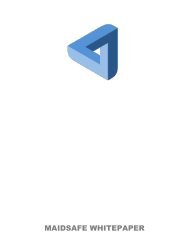Whitepaper - Ethereum Classic With Cover
Create successful ePaper yourself
Turn your PDF publications into a flip-book with our unique Google optimized e-Paper software.
<strong>Ethereum</strong> <strong>Classic</strong> Documentation, Release 0.1<br />
Details<br />
Project reboot<br />
The project is going through a reboot under new leadership. At the time of writing, we have a number of moving<br />
parts. Please bear with us!<br />
We simplified the project naming at Homestead, although some naming shadows of the past still linger. There was<br />
a further C++ development update from Christian in May 2016.<br />
The next big step is our pending git repository reorganization, which will move our code back into the cppethereum<br />
repository.<br />
We are also working toward re-licensing the codebase as Apache 2.0, which would be the culmination of a very<br />
long-term plan to liberalize the core. An effort was begun in 2015 to re-license the cpp-ethereum core as MIT, but it<br />
was never completed. This is a revival of that effort, especially with a view towards the potential for collaboration<br />
with the Linux Foundation‘s Hyperledger project.<br />
Current reality (squares are applications, circles are libraries):<br />
Target refactoring:<br />
History of the code<br />
The C++ <strong>Ethereum</strong> project was initiated by Gavin Wood, the former CTO of the <strong>Ethereum</strong> Foundation, in December<br />
2013. It is the second most popular of the clients, trailing a long way behind the dominant geth client, also<br />
built by the <strong>Ethereum</strong> Foundation.<br />
Many of the original C++ developers moved on to roles at Slock.it and Ethcore in late 2015 and early 2016<br />
following a 75% cut in funding for C++ development. Those cuts were part of a broader effort to bring Foundation<br />
costs under control, and they happened prior to the recent spike in ETH value which has put the Foundation in a<br />
much more comfortable financial position.<br />
See Contributors for the full list of everybody who has worked on the code.<br />
Portability<br />
The <strong>Ethereum</strong> C++ client code is exceedingly portable, and is being successfully used on a huge range of different<br />
operating systems and devices.<br />
We continue to expand our range and are very open to pull-requests which add support for additional operating<br />
systems, compilers or devices.<br />
Operating systems verified as working<br />
• Linux<br />
– Alpine Linux<br />
– Arch Linux<br />
– Debian 8 (Jessie)<br />
– Fedora 20<br />
– Fedora 21<br />
– Fedora 22<br />
– openSUSE Leap 42.1<br />
– Raspbian<br />
– Sailfish OS 2.0<br />
20 Chapter 1. Contents




